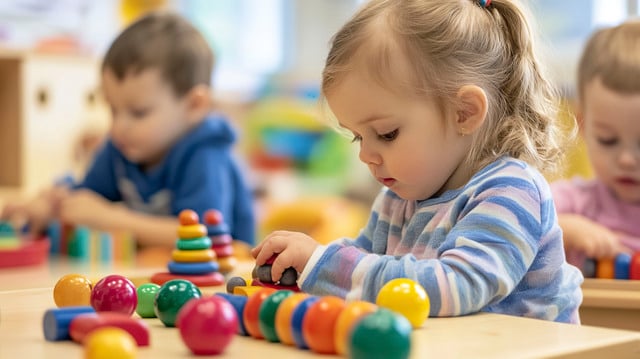
Problem-solving is one of the most valuable skills a child can develop during the early years. It influences how children approach challenges, make decisions, and interact with the world. Preschool programs that encourage creativity allow children to practice these skills in engaging, supportive ways. In communities like Doral, families benefit from schools that understand how the environment shapes thinking and confidence.
Parents often visit KLA Schools in Doral because they want to see how classroom design, teaching strategies, and interactive play inspire children to tackle challenges independently. Creative learning environments encourage curiosity and persistence, two traits that help children grow into resilient problem-solvers. When programs combine open-ended exploration with guided support, children discover that every challenge holds an opportunity to learn.
The Role of Environment in Early Problem-Solving Skills
Children learn best in spaces that invite exploration and discovery. A well-designed preschool classroom uses organization, natural light, and accessible materials to create an atmosphere that sparks curiosity. When children encounter puzzles, blocks, and art supplies, they naturally experiment, test ideas, and adjust when outcomes change.
Environments that encourage trial and error support growth in critical thinking. Children learn that mistakes are not failures but stepping stones toward solutions. This mindset builds resilience, which is essential for handling academic and social challenges later in life.
Play as a Laboratory for Creative Thinking
Play is more than entertainment; it is a child’s first form of research. Pretend play, construction activities, and outdoor games all give children opportunities to test ideas, collaborate, and solve problems. Whether they are negotiating rules during a game or building a tower with friends, children practice patience, flexibility, and cooperation.
Creative play fosters divergent thinking, which allows children to see multiple solutions to a single problem. This kind of thinking develops persistence and adaptability, qualities that serve children well throughout school and beyond.
Teacher Guidance That Encourages Independence
Educators in Doral preschools act as facilitators rather than directors. Instead of providing immediate answers, teachers guide children with thoughtful questions. Asking “What do you think will happen if…?” encourages reflection and analysis.
This approach strengthens children’s confidence in their own abilities. When teachers create space for experimentation, children learn to rely on their reasoning and collaborate with peers. The result is not only knowledge but also a belief in their capacity to find solutions independently.
Collaboration as a Foundation for Social Problem Solving
Problem-solving extends beyond academic tasks. Children learn how to share materials, take turns, and compromise when working with peers. Group projects and cooperative games highlight the importance of listening, understanding perspectives, and reaching agreements.
Preschool environments that emphasize collaboration help children develop empathy and negotiation skills. These experiences prepare them for future teamwork in both academic and personal settings, reinforcing the idea that challenges can be solved collectively.
Materials That Inspire Exploration and Innovation
The tools available in a classroom shape how children think and learn. Open-ended materials like blocks, clay, and natural objects provide countless possibilities for creation. Unlike toys with fixed purposes, these resources allow children to imagine and invent, sparking innovative solutions.
When children explore materials with no predetermined outcome, they learn to adapt, experiment, and innovate. This freedom strengthens their ability to analyze situations, make choices, and adjust strategies, all of which contribute to problem-solving confidence.
Outdoor Learning and Real-World Challenges
Outdoor environments also play a vital role in developing problem-solving skills. Nature provides unpredictable challenges that require observation and creativity. Whether navigating playground equipment, exploring gardens, or engaging in group games, children practice risk assessment, coordination, and resilience.
Experiences outside the classroom expand a child’s perspective and offer practical applications of problem-solving skills. Real-world challenges help children understand that early learning occurs not only indoors but also everywhere they explore.
The Long-Term Value of Early Problem-Solving Skills
Problem-solving abilities developed in preschool extend into every stage of life. Children who learn to approach challenges with confidence demonstrate stronger academic performance, greater independence, and more positive social interactions. These skills support adaptability in a world that requires creativity and resilience.
Families who explore programs like those from KLA Schools in Doral recognize the value of environments that prioritize problem-solving. When children are encouraged to think critically, express ideas, and collaborate with peers, they develop abilities that influence success far beyond the preschool years.
Helping Families Identify the Right Environment
Parents evaluating preschools in Doral should focus on how spaces, materials, and teaching strategies promote creative problem-solving. Classrooms filled with open-ended tools, teachers who ask guiding questions, and opportunities for collaboration all point to programs that prepare children for the future.
Confidence, curiosity, and resilience are built through daily practice. Families who choose environments that encourage creativity ensure their children grow into problem-solvers who approach life with optimism and determination.
Disclaimer
The information contained in South Florida Reporter is for general information purposes only.
The South Florida Reporter assumes no responsibility for errors or omissions in the contents of the Service.
In no event shall the South Florida Reporter be liable for any special, direct, indirect, consequential, or incidental damages or any damages whatsoever, whether in an action of contract, negligence or other tort, arising out of or in connection with the use of the Service or the contents of the Service. The Company reserves the right to make additions, deletions, or modifications to the contents of the Service at any time without prior notice.
The Company does not warrant that the Service is free of viruses or other harmful components












